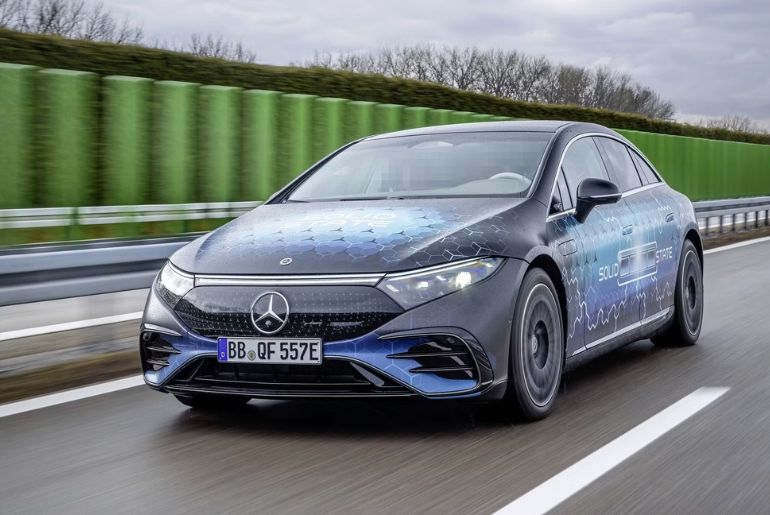In a significant leap toward next-generation electric mobility, Mercedes-Benz has begun road-testing electric vehicles powered by solid-state batteries, a revolutionary technology that could soon deliver over 600 miles of driving range on a single charge.
Earlier this year, the German automaker achieved a critical milestone by putting “the first car powered by a lithium-metal solid-state battery on the road” for testing. These test drives are being conducted in the UK using a modified version of the Mercedes EQS, fitted with solid-state battery packs co-developed by Mercedes-Benz and its Formula 1 technology arm, Mercedes AMG High-Performance Powertrains (HPP).
A Strategic Partnership with Factorial Energy
Mercedes-Benz is collaborating with US-based battery startup Factorial Energy to bring the advanced battery chemistry to production vehicles. In September, the two companies revealed the Solstice, an all-solid-state battery promising up to 25% greater range than conventional lithium-ion batteries. The joint development marks Mercedes’ push to make solid-state batteries a central pillar of its future EV lineup.
Markus Schäfer, Mercedes-Benz’s Chief Technology Officer, shared the company’s ambitious timeline: “We expect to bring the technology into series production before the end of the year,” he said at an industry event in Copenhagen, adding that fully solid-state powered vehicles could hit the market as early as 2030.
Extended Range and Cost Savings
The new solid-state batteries are expected to extend driving range by 25% compared to current lithium-ion packs. For reference, the Mercedes EQS 450+, rated with a WLTP range of 511 miles, could potentially exceed 620 miles using the solid-state variant.
Beyond range improvements, the batteries are also expected to significantly cut manufacturing and operational costs. Schäfer emphasised that “current batteries won’t suffice” and that “at the core, a new chemistry is needed.” Mercedes and Factorial are using a sulphide-based solid electrolyte, known for its high energy density, safety benefits, and improved performance.
A Global Race for Solid-State Dominance
Factorial is also working with other major automakers, including Hyundai and Stellantis, with all parties eyeing 2030 as the commercial launch window for solid-state EV batteries.
Meanwhile, global giants like Toyota, Nissan, Honda, BMW, and Volkswagen are investing heavily in the same space. Chinese battery leaders CATL and BYD, who already dominate global EV battery supply chains, are also fast-tracking their solid-state battery programmes.
As competition intensifies, Mercedes-Benz appears poised to be among the first traditional automakers to bring solid-state battery-powered EVs to market, signalling a major transformation in energy storage and electric mobility.
With industry experts hailing solid-state batteries as the “holy grail” of EV technology, Mercedes-Benz’s advancements could redefine the electric vehicle landscape—making ultra-long range and faster, safer charging a reality in the next five years.

